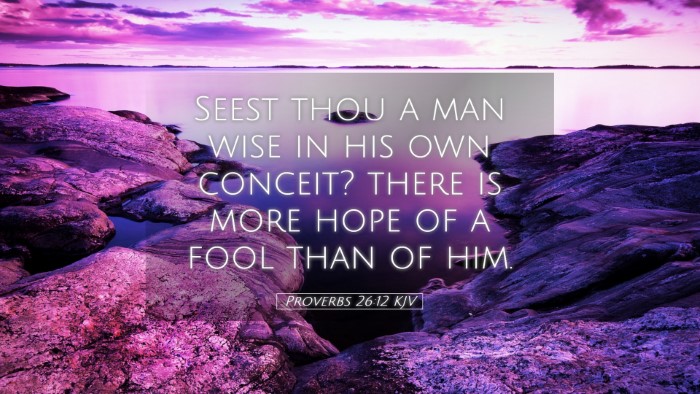Commentary on Proverbs 26:12
Verse Text: "Seest thou a man wise in his own conceit? there is more hope of a fool than of him."
Introduction
The verse Proverbs 26:12 serves as a cautionary statement about the dangers of pride and self-perception. This text emphasizes the folly of those who see themselves as wise without recognizing their limitations. As pastors, students, theologians, and scholars reflect on this passage, they uncover valuable lessons regarding humility, wisdom, and the nature of true understanding.
Exegesis of the Text
In biblical Hebrew, the term translated as “wise” reflects a sense of understanding and insight that one believes they possess. The phrase "wise in his own conceit" highlights an individual who is not only self-assured but is deceived by that self-assurance. This internal complacency renders them unable to grow or accept correction.
Insights from Matthew Henry
Matthew Henry, in his commentary, emphasizes that a man who is "wise in his own conceit" is often blind to his own faults. He notes that such individuals often lack the ability to learn from experience because they are overly confident in their knowledge. Henry asserts:
- "The greatest of fools is he that thinks himself wise."
- "Humility is the key to true wisdom."
According to Henry, those who are wise in their own eyes are frequently more obstinate and less teachable than a fool, who can at least recognize his own folly and has a chance for learning and growth.
Insights from Albert Barnes
Albert Barnes offers a practical interpretation of this proverb, suggesting that arrogance and self-satisfaction make individuals less receptive to guidance and instruction. Barnes states that a man who is wise in his own conceit:
- "is in a more perilous condition than a fool, for he is unwilling to admit his ignorance."
- "His conceit leads to destruction because he neither seeks wisdom nor acknowledges his own folly."
He draws attention to the paradox that those who recognize their limitations are more likely to benefit from life's lessons than those who are unaware of their shortcomings.
Insights from Adam Clarke
Adam Clarke adds a theological dimension to the understanding of this verse. He recognizes the inherent danger of self-deception. Clarke posits that:
- "There is a blinding of the soul that comes from overestimating one's own wisdom."
- "True wisdom involves an understanding of one’s limits before God and man."
Clarke contends that one's wisdom should not merely come from personal experience but should be rooted in divine understanding and humility before God.
Theological Implications
From a theological perspective, Proverbs 26:12 serves as a sobering reminder of the necessity of humility before God. This passage challenges believers to examine whether they are relying on their own understanding rather than the counsel of God.
- Humility Before God: Recognizing our limitations is crucial in building a strong relationship with God.
- Wisdom Through Community: Seeking wisdom through external sources and community is vital for spiritual growth.
- Growth Mindset: Acknowledging one's limitations allows for a mindset that is prepared to learn and grow.
Practical Applications for Today
For pastors, students, and theologians, the implications of this proverb can manifest in various practical ways:
- Preaching and Teaching: Ensure that sermons and lessons emphasize the importance of humility and the dangers of arrogance.
- Personal Reflection: Leaders should regularly practice self-examination to avoid the pitfalls of pride.
- Engagement with Others: Foster environments where others feel safe to challenge and teach, embracing a communal wisdom.
Conclusion
Proverbs 26:12 starkly illustrates the dangerous path of self-conceit. By drawing from the insights of respected commentators such as Matthew Henry, Albert Barnes, and Adam Clarke, we see that true wisdom involves a humble recognition of our own limitations and a willingness to learn from others. As we strive for wisdom, let us remember that the path to understanding is paved with humility and a readiness to grow.


